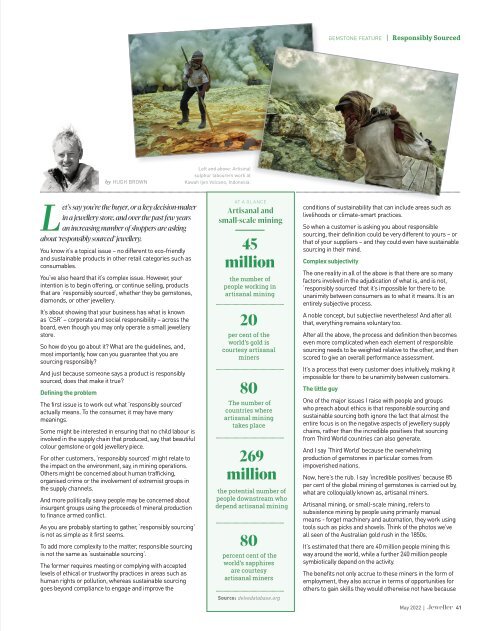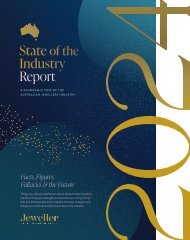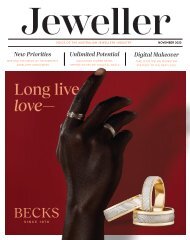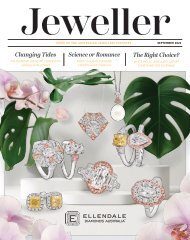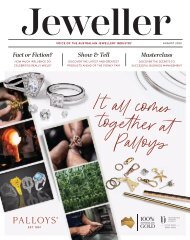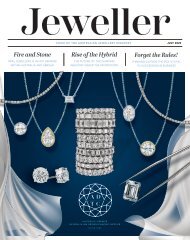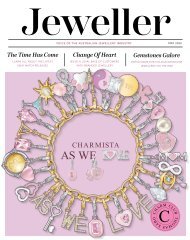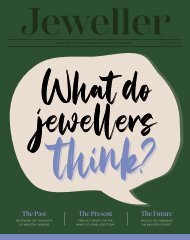Jeweller - May 2022
A new era: The pearl industry has been strengthened by adversity Responsibly sourced: Retailers want to provide it, but what does it really mean? Crystal ball: In order to predict trends, we learn from the past
A new era: The pearl industry has been strengthened by adversity
Responsibly sourced: Retailers want to provide it, but what does it really mean?
Crystal ball: In order to predict trends, we learn from the past
You also want an ePaper? Increase the reach of your titles
YUMPU automatically turns print PDFs into web optimized ePapers that Google loves.
GEMSTONE FEATURE | Responsibly Sourced<br />
by HUGH BROWN<br />
Left and above: Artisinal<br />
sulphur labourers work at<br />
Kawah Ijen Volcano, Indonesia.<br />
Let’s say you’re the buyer, or a key decision-maker<br />
in a jewellery store, and over the past few years<br />
an increasing number of shoppers are asking<br />
about ‘responsibly sourced’ jewellery.<br />
You know it’s a topical issue – no different to eco-friendly<br />
and sustainable products in other retail categories such as<br />
consumables.<br />
You’ve also heard that it’s complex issue. However, your<br />
intention is to begin offering, or continue selling, products<br />
that are ‘responsibly sourced’, whether they be gemstones,<br />
diamonds, or other jewellery.<br />
It’s about showing that your business has what is known<br />
as ‘CSR’ – corporate and social responsibility – across the<br />
board, even though you may only operate a small jewellery<br />
store.<br />
So how do you go about it? What are the guidelines, and,<br />
most importantly, how can you guarantee that you are<br />
sourcing responsibly?<br />
And just because someone says a product is responsibly<br />
sourced, does that make it true?<br />
Defining the problem<br />
The first issue is to work out what ‘responsibly sourced’<br />
actually means. To the consumer, it may have many<br />
meanings.<br />
Some might be interested in ensuring that no child labour is<br />
involved in the supply chain that produced, say, that beautiful<br />
colour gemstone or gold jewellery piece.<br />
For other customers, ‘responsibly sourced’ might relate to<br />
the impact on the environment, say, in mining operations.<br />
Others might be concerned about human trafficking,<br />
organised crime or the involvement of extremist groups in<br />
the supply channels.<br />
And more politically savvy people may be concerned about<br />
insurgent groups using the proceeds of mineral production<br />
to finance armed conflict.<br />
As you are probably starting to gather, ‘responsibly sourcing’<br />
is not as simple as it first seems.<br />
To add more complexity to the matter, responsible sourcing<br />
is not the same as ‘sustainable sourcing’.<br />
The former requires meeting or complying with accepted<br />
levels of ethical or trustworthy practices in areas such as<br />
human rights or pollution, whereas sustainable sourcing<br />
goes beyond compliance to engage and improve the<br />
AT A GL A NCE<br />
Artisanal and<br />
small-scale mining<br />
45<br />
million<br />
the number of<br />
people working in<br />
artisanal mining<br />
20<br />
per cent of the<br />
world’s gold is<br />
courtesy artisanal<br />
miners<br />
80<br />
The number of<br />
countries where<br />
artisanal mining<br />
takes place<br />
269<br />
million<br />
the potential number of<br />
people downstream who<br />
depend artisanal mining<br />
80<br />
percent cent of the<br />
world’s sapphires<br />
are courtesy<br />
artisanal miners<br />
Source: delvedatabase.org<br />
conditions of sustainability that can include areas such as<br />
livelihoods or climate-smart practices.<br />
So when a customer is asking you about responsible<br />
sourcing, their definition could be very different to yours – or<br />
that of your suppliers – and they could even have sustainable<br />
sourcing in their mind.<br />
Complex subjectivity<br />
The one reality in all of the above is that there are so many<br />
factors involved in the adjudication of what is, and is not,<br />
‘responsibly sourced’ that it’s impossible for there to be<br />
unanimity between consumers as to what it means. It is an<br />
entirely subjective process.<br />
A noble concept, but subjective nevertheless! And after all<br />
that, everything remains voluntary too.<br />
After all the above, the process and definition then becomes<br />
even more complicated when each element of responsible<br />
sourcing needs to be weighted relative to the other, and then<br />
scored to give an overall performance assessment.<br />
It’s a process that every customer does intuitively, making it<br />
impossible for there to be unanimity between customers.<br />
The little guy<br />
One of the major issues I raise with people and groups<br />
who preach about ethics is that responsible sourcing and<br />
sustainable sourcing both ignore the fact that almost the<br />
entire focus is on the negative aspects of jewellery supply<br />
chains, rather than the incredible positives that sourcing<br />
from Third World countries can also generate.<br />
And I say ‘Third World’ because the overwhelming<br />
production of gemstones in particular comes from<br />
impoverished nations.<br />
Now, here’s the rub. I say ‘incredible positives’ because 85<br />
per cent of the global mining of gemstones is carried out by,<br />
what are colloquially known as, artisanal miners.<br />
Artisanal mining, or small-scale mining, refers to<br />
subsistence mining by people using primarily manual<br />
means - forget machinery and automation, they work using<br />
tools such as picks and shovels. Think of the photos we’ve<br />
all seen of the Australian gold rush in the 1850s.<br />
It’s estimated that there are 40 million people mining this<br />
way around the world, while a further 240 million people<br />
symbiotically depend on the activity.<br />
The benefits not only accrue to these miners in the form of<br />
employment, they also accrue in terms of opportunities for<br />
others to gain skills they would otherwise not have because<br />
<strong>May</strong> <strong>2022</strong> | 41


